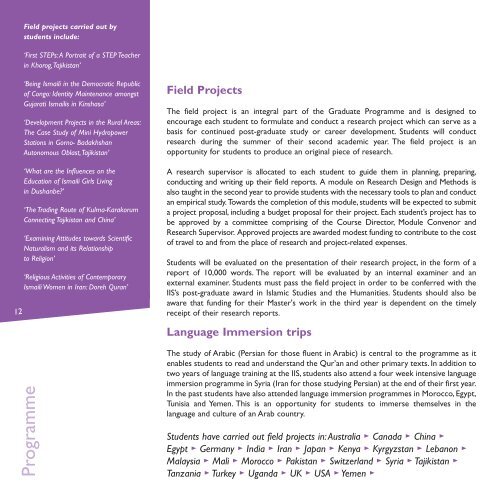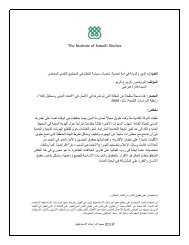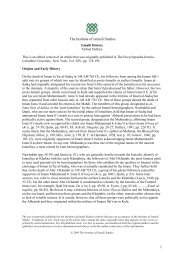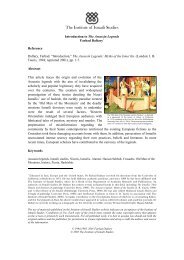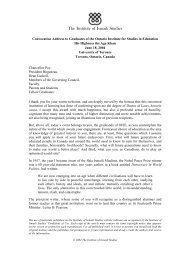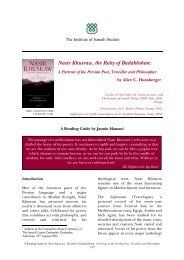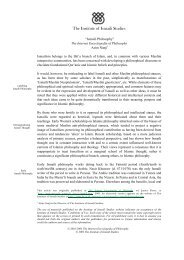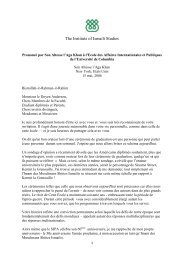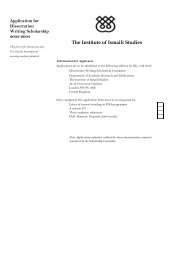GPISH prospectus 2011_Layout 1.qxd - The Institute of Ismaili Studies
GPISH prospectus 2011_Layout 1.qxd - The Institute of Ismaili Studies
GPISH prospectus 2011_Layout 1.qxd - The Institute of Ismaili Studies
Create successful ePaper yourself
Turn your PDF publications into a flip-book with our unique Google optimized e-Paper software.
Field projects carried out by<br />
students include:<br />
‘First STEPs: A Portrait <strong>of</strong> a STEP Teacher<br />
in Khorog, Tajikistan’<br />
12<br />
‘Being <strong>Ismaili</strong> in the Democratic Republic<br />
<strong>of</strong> Congo: Identity Maintenance amongst<br />
Gujarati <strong>Ismaili</strong>s in Kinshasa’<br />
‘Development Projects in the Rural Areas:<br />
<strong>The</strong> Case Study <strong>of</strong> Mini Hydropower<br />
Stations in Gorno- Badakhshan<br />
Autonomous Oblast, Tajikistan’<br />
‘What are the Influences on the<br />
Education <strong>of</strong> <strong>Ismaili</strong> Girls Living<br />
in Dushanbe?’<br />
‘<strong>The</strong> Trading Route <strong>of</strong> Kulma-Karakorum<br />
Connecting Tajikistan and China’<br />
‘Examining Attitudes towards Scientific<br />
Naturalism and its Relationship<br />
to Religion’<br />
‘Religious Activities <strong>of</strong> Contemporary<br />
<strong>Ismaili</strong> Women in Iran: Doreh Quran’<br />
Programme<br />
Field Projects<br />
<strong>The</strong> field project is an integral part <strong>of</strong> the Graduate Programme and is designed to<br />
encourage each student to formulate and conduct a research project which can serve as a<br />
basis for continued post-graduate study or career development. Students will conduct<br />
research during the summer <strong>of</strong> their second academic year. <strong>The</strong> field project is an<br />
opportunity for students to produce an original piece <strong>of</strong> research.<br />
A research supervisor is allocated to each student to guide them in planning, preparing,<br />
conducting and writing up their field reports. A module on Research Design and Methods is<br />
also taught in the second year to provide students with the necessary tools to plan and conduct<br />
an empirical study.Towards the completion <strong>of</strong> this module, students will be expected to submit<br />
a project proposal, including a budget proposal for their project. Each student’s project has to<br />
be approved by a committee comprising <strong>of</strong> the Course Director, Module Convenor and<br />
Research Supervisor. Approved projects are awarded modest funding to contribute to the cost<br />
<strong>of</strong> travel to and from the place <strong>of</strong> research and project-related expenses.<br />
Students will be evaluated on the presentation <strong>of</strong> their research project, in the form <strong>of</strong> a<br />
report <strong>of</strong> 10,000 words. <strong>The</strong> report will be evaluated by an internal examiner and an<br />
external examiner. Students must pass the field project in order to be conferred with the<br />
IIS’s post-graduate award in Islamic <strong>Studies</strong> and the Humanities. Students should also be<br />
aware that funding for their Master's work in the third year is dependent on the timely<br />
receipt <strong>of</strong> their research reports.<br />
Language Immersion trips<br />
<strong>The</strong> study <strong>of</strong> Arabic (Persian for those fluent in Arabic) is central to the programme as it<br />
enables students to read and understand the Qur’an and other primary texts. In addition to<br />
two years <strong>of</strong> language training at the IIS, students also attend a four week intensive language<br />
immersion programme in Syria (Iran for those studying Persian) at the end <strong>of</strong> their first year.<br />
In the past students have also attended language immersion programmes in Morocco, Egypt,<br />
Tunisia and Yemen. This is an opportunity for students to immerse themselves in the<br />
language and culture <strong>of</strong> an Arab country.<br />
Students have carried out field projects in: Australia ► Canada ► China ►<br />
Egypt ► Germany ► India ► Iran ► Japan ► Kenya ► Kyrgyzstan ► Lebanon ►<br />
Malaysia ► Mali ► Morocco ► Pakistan ► Switzerland ► Syria ► Tajikistan ►<br />
Tanzania ► Turkey ► Uganda ► UK ► USA ► Yemen ►


